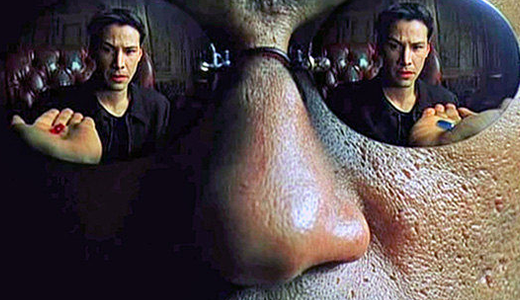An interesting new viral movement has been gathering momentum lately: A lot of young people are proudly reporting via YouTube and other sites that they’ve “taken the Red Pill.”
No, that’s not another new drug. Nor does it have anything to do with a similarly named “pick-up culture/anti-feminism” discussion on Reddit that some people are kicking about there. Instead, the Red Pill declaration is actually a more general proclamation of independent thought … as well as being an obvious metaphorical nod to a certain science-fiction classic. So, let’s start there.
In the trippy sci-fi flick The Matrix, a resistance leader named Morpheus offers the tech-focused hero, Neo, the choice of taking a blue pill or a red one. The blue pill will let Neo comfortably remain in the repressive, deceptive world that he’s been a part of and completely blinded by. “You wake up in your bed and believe whatever you want to believe,” Morpheus tells him. But the red pill will have him “tumble down the rabbit hole,” he’ll see the world for what it really is and have to honestly face everything about his life that was a lie.
So what does that mean for the individuals at the heart of the Red Pill movement?
Well, they say it’s all about shaking their lives up: They’re questioning things that they’ve been taught and always just taken for granted as being true. Or as one YouTube poster who goes by the user name Blonde in the Belly of the Beast put it: “You begin to see through narratives you’ve been told your whole life about gender, race, culture, globalism, sex, society, relationships. You begin to develop an intellectual curiosity that you apply to your life, to find answers for yourself.”
That’s a pretty big deal in this day and age when it’s generally believed that young people tend to approach social and cultural issues with a monolithic perspective. In fact, it’s that very collectivist mindset that these Millennials are pushing back against with their social media commentaries and online declarations.
Blonde suggested that her “red pilling” experience was akin to that “point in middle school, or maybe a bit younger, when you realize—perhaps based on an error that your parents made—that they don’t hold all the answers. I think this happens to everyone. In a single moment it puts a tremendous weight of personal responsibility on your shoulders and frightens you, because you realize that your journey is your own.”
Now, some people on the outside of this intellectual campaign have said that the whole thing is a negative political ploy. They claim that it’s something designed to keep young people ignorant of important social issues. But some Red Pillers say that couldn’t be further from the truth.
You can find teens and twentysomethings voicing perspectives on all sides of the political aisle, for one thing. And their postings declare that theirs is a broad quest to actually explore the truth behind these cultural and social issues. They state that their movement is something prompted by an accumulation of personal experiences, a questioning of society’s dysfunctions and a common recognition that they’re tired of being told what they can and cannot think.
One self-described feminist named Laci Green, for instance, said, “The Red Pill is a meme that refers to the realization that the world isn’t nearly as simple as you thought it was. … The question, of course, is: ‘What is the truth?'” She balks wholeheartedly at the fact that some social media fans who used to cheer her views have suddenly savaged her online simply because she’s raised a few questions and has actually taken the time to talk to people with opposing views.
And that is truly what all these Red Pillers have in common. If you watch their videos and read their blogs, they all proclaim that cognitive dissonance is vital, and that becoming more well-read and focused on self-improvement is key. Or as Laci Green put it, people should be “questioning even the seemingly unquestionable and being willing to adjust their beliefs as they get new information.”
Personally, I can’t help but see that fundamental skepticism as being positive in many ways. Let’s face it, we tend to want others to believe as we do: to see the world through our filter. But isn’t it important that young people actually search for truth and think through their social, cultural, moral and spiritual choices rather than walk in lockstep to the piper’s tune of the culture at large?
As I’ve looked through some of the Red Pill vids I’ve watched bright and curious young people report their emotional shock at how just raising a few questions about their pre-processed secular worldview has helped the scales fall away from their eyes. “I can’t unsee what I’m starting to see now,” one teen guy declared. And doesn’t that give us all hope for the chance of seeing a better future?






Recent Comments